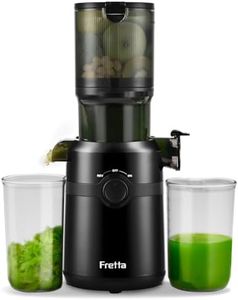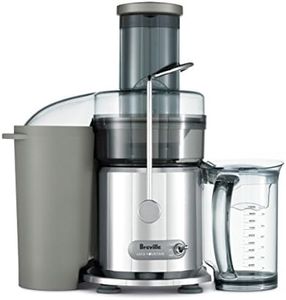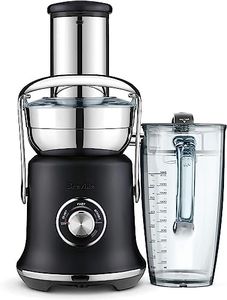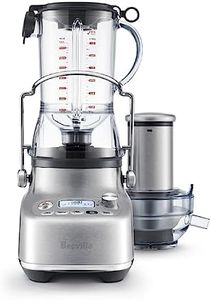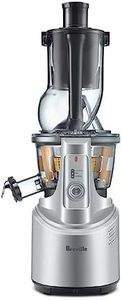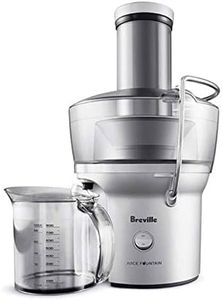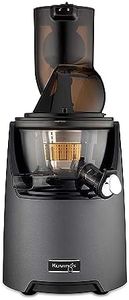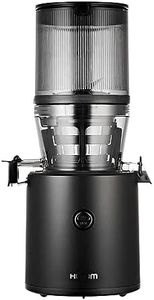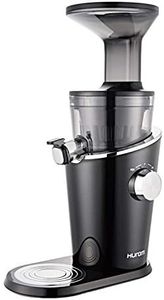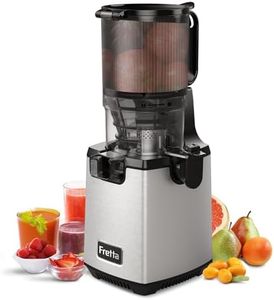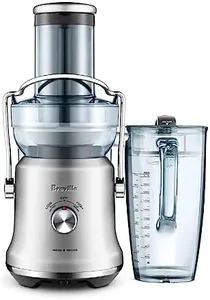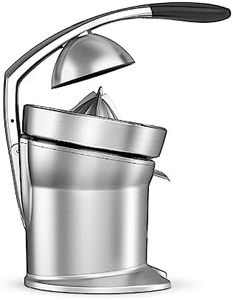We Use CookiesWe use cookies to enhance the security, performance,
functionality and for analytical and promotional activities. By continuing to browse this site you
are agreeing to our privacy policy
10 Best Juicers
From leading brands and best sellers available on the web.By clicking on a link to a third party's website, log data is shared with that third party.
Buying Guide for the Best Juicers
When looking to buy a juicer, it’s important to understand what kind of juice you want to make and how much effort you are willing to put into preparation and cleaning. Juicers come in different types and with differing features, so identifying your main uses—like making green juices, fruit juices, or nut milks—will help guide your choice. Think about how fast you want your juice, how much juice you need at a time, and how easy you’d like it to be to clean and maintain your machine.Juicer Type (Centrifugal vs. Masticating)This refers to the mechanism the juicer uses to extract juice from fruits and vegetables. Centrifugal juicers are generally faster and better for harder fruits and vegetables, spinning at high speed to separate juice from pulp. Masticating (or slow/cold press) juicers crush and press produce at a slower rate, which preserves more nutrients and yields more juice especially from leafy greens, but also takes more time. If you want quick juices mainly from fruits and firm veggies, a centrifugal juicer may suit you. If you prioritize juice quality, nutrient preservation, and want to juice greens or wheatgrass, masticating is better.
Pulp EjectionThis spec describes how the juicer handles leftover pulp. Some juicers have external pulp ejection, where pulp is pushed outside into a container, allowing continuous juicing. Others collect pulp inside, which means you have to stop and empty it more often. If you plan to juice large amounts at once, external ejection is convenient. For occasional single servings, internal collection is usually fine.
Feed Chute SizeThis tells you how big an opening you have to put produce into the juicer. Wider chutes let you add whole fruits or larger chunks, saving you cutting and prep time. Narrow chutes require more chopping. If you value speed and ease of use, look for a wider feed chute. If space is limited and you don’t mind a little extra prep, a smaller chute is reasonable.
Ease of CleaningThis spec focuses on how simple it is to disassemble and clean the juicer after use. Some models have dishwasher-safe parts or fewer separate components, making cleanup quicker. If you’ll be juicing daily, easy cleaning may encourage you to use it more often. For occasional juicers, ease of cleaning might be less critical, but still important to avoid frustration.
Juice YieldJuice yield is how much juice you get from the amount of fruits or veggies you put in. High-yield juicers extract more juice per serving, which means less waste and sometimes better flavor and nutrition. If getting the most from your produce is important to you—perhaps because you’re juicing expensive or organic items—look for models known for high yield. If you’re less concerned about a little waste, this may be less important.
Noise LevelSome juicers, especially centrifugal types, can be quite loud, while masticating juicers tend to be quieter. If you’ll be juicing early in the morning or in close quarters, you may want a quieter machine. If noise isn’t an issue for you, this may not be a top priority.
Size and StorageThis refers to the physical dimensions and how easy the juicer is to store. Larger machines may not fit well on every countertop or in every cabinet. If kitchen space is at a premium or you want to keep it stored away, look at more compact options. If you juice often and want it always available, size may matter less.

